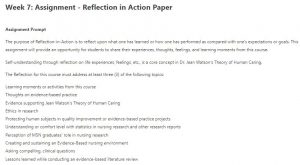Week 7: Assignment – Reflection in Action Paper
Assignment Prompt
The purpose of Reflection-in-Action is to reflect upon what one has learned or how one has performed as compared with one’s expectations or goals. Reflection in Action Paper. This assignment will provide an opportunity for students to share their experiences, thoughts, feelings, and learning moments from this course. Reflection in Action Paper.
Self-understanding through reflection on life experiences, feelings, etc., is a core concept in Dr. Jean Watson’s Theory of Human Caring.
The Reflection for this course must address at least three (3) of the following topics:
Learning moments or activities from this course
Thoughts on evidence-based practice
Evidence supporting Jean Watson’s Theory of Human Caring
Ethics in research
Protecting human subjects in quality improvement or evidence-based practice projects
Understanding or comfort level with statistics in nursing research and other research reports
Perception of MSN graduates’ role in nursing research
Creating and sustaining an Evidence-Based nursing environment
Asking compelling, clinical questions
Lessons learned while conducting an evidence-based literature review
ORDER A PLAGIARISM-FREE PAPER HERE !!
Solution
Week 7: Assignment – Reflection in Action Paper
Introduction
The course has been full of learning activities and moments, which I am sure, will be of great significance in developing me and my future roles as a caregiver. There are numerous concepts that I have learned that I previously had shallow knowledge about or even lacked information about. In the beginning, I had a lot of expectations regarding the course, which I can confirm that I have managed to achieve and even surpassed others. I have learned that it is possible to apply the knowledge obtained to deliver more comprehensive and effective care to patients throughout the course.
Thoughts on Evidence-Based Practice
According to the information obtained through the course, evidence-based practice is critical in medical practice. It entails conducting research to come up with evidence and sets of data that will help improve practice. Reflection in Action Paper. The evidence obtained from the studies is impactful, as they are incorporated in practice to improve care delivery to patients. Evidence obtained from these research and studies is applied together with professional expertise to guide clinical decision-making and boost innovative ideas, which are essential in solving various problems within the healthcare system (Mackey & Bassendowski, 2017). This training has taught me the need to understand patient needs and use research findings to make the most appropriate decisions to address these needs.
Ethics in Research
This is also an area where I have learned a lot. I have always believed in the need to uphold human dignity in all aspects of life. There is a need to adhere to the moral norms that guide research to ensure that all human subjects involved do not get their rights violated in the process. Reflection in Action Paper. Researchers using human subjects in biomedical research must adhere to these norms by safeguarding their various concerns such as dignity, life, self-determination, privacy, and secrecy of their information (Yip et al., 2016). Research misconduct involves non-adherence to the ethical principle guiding research. Reflection in Action Paper.
This occurs when human subjects are exposed to harm, a lack of informed consent, participants being lured into taking part in the research, and failure to ensure confidentiality of participants’ information (Yip et al., 2016). I have also learned that the three ethical principles, kindness, respect, and fairness, must all be upheld to help ensure that participants are protected from any damage the research may expose them to, finding better ways of mitigating resulting damage, and maximizing the study benefits.
Protecting Human Subjects in Quality Improvement or Evidence-Based Practice Projects
Ethics in research and the protection of human subjects were significant areas in which I can say I learned a lot. Quality improvement projects involving human subjects require the protection of the subjects, just as they are protected in research. This requires the cooperation between the subjects and the implementers of such projects to enhance their success. There is a need for implementers of these projects to critically analyze the particular problem being addressed and select their subjects appropriately. This should follow obtaining informed consent from the participants, whose privacy and confidentiality must be upheld (Yip et al., 2016). This prevents their health information from getting accessed by unauthorized individuals. Through the knowledge obtained, therefore, I will be able to lead quality improvement initiatives to help in finding better ways of managing patients while at the same time safeguarding their rights and minimizing possible risks that such projects may have on their well-being.
Conclusion
This nursing course has been of great significance, as it addresses essential components which help guide nursing practice. The application of evidence-based practice is vital in enhancing better practice and understanding the need for the protection of human subjects in research and quality improvement projects. This will help reduce harm to the participants and maximize the benefits of these studies, which will help improve the nursing practice.
References
Mackey, A., & Bassendowski, S. (2017). The history of evidence-based practice in nursing education and practice. Journal of Professional Nursing, 33(1), 51-55. https://www.sciencedirect.com/science/article/pii/S875572231630028X
Yip, C., Han, N. L. R., & Sng, B. L. (2016). Legal and ethical issues in research. Indian journal of anaesthesia, 60(9), 684. https://www.ncbi.nlm.nih.gov/pmc/articles/PMC5037952/
